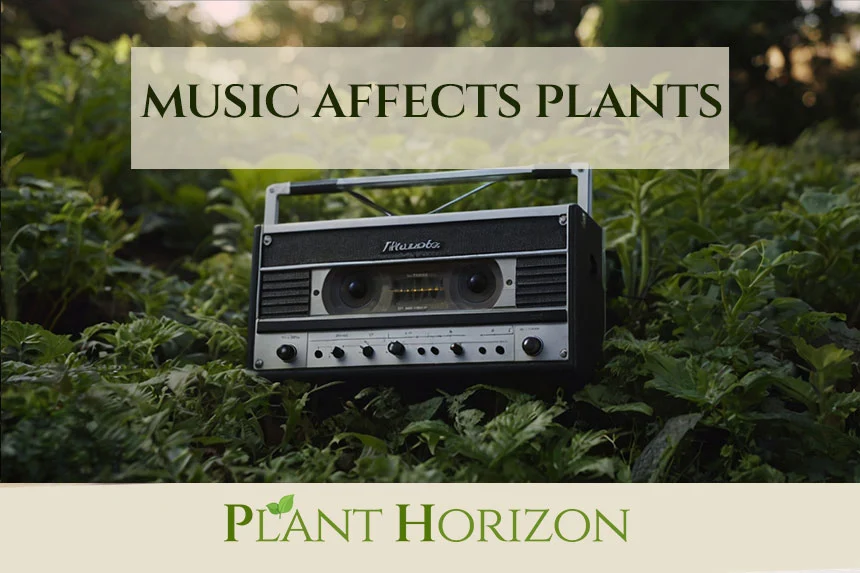music affects plants : Plants are fascinating organisms that respond to various external stimuli, from light and water to sound. But does music affect plant growth? This intriguing question has been debated for decades, blending science, anecdotal evidence, and even myth. In this article, we’ll explore the science behind the relationship between music and plant growth, including famous studies, theories, and actionable insights for plant enthusiasts.
What the Science Says About Music and Plant Growth
Over time, researchers have investigated how plants respond to sound vibrations, such as those generated by music. While plants don’t have ears, they can sense vibrations, which might influence their physical and chemical processes. Several key studies shed light on this phenomenon.
The Role of Vibrations in Plant Growth
Plants rely heavily on their environment, and vibrations play a critical role in how they interact with it. Studies suggest that plants can “hear” vibrations from sources like wind, insects, and even sound waves. According to a 2014 study published in Nature, plants exposed to specific sound frequencies exhibited changes in their biological activity, such as faster root growth or improved seed germination rates.
Music is essentially a series of sound vibrations. When plants are exposed to music, the vibrations may stimulate certain growth processes. However, the type, frequency, and duration of music exposure can significantly affect the outcome.
Studies Supporting the Effects of Music on Plants
If you’ve ever wondered whether playing music for your plants actually makes a difference, you’re not alone. Numerous experiments and studies have tried to answer this question. Here are some notable examples:
The Dorothy Retallack Experiment
One of the most famous experiments regarding music and plant growth was conducted by Dorothy Retallack in the 1970s. Using identical plants in controlled environments, she exposed them to different types of music, including classical, jazz, and hard rock. Her findings suggested that plants exposed to classical music thrived, while those exposed to hard rock music showed signs of stress and poor growth.
Indian Agricultural Studies
In India, scientists have also explored how music might enhance agricultural productivity. Farmers in certain areas use traditional music to promote plant health. Their empirical findings reveal that soothing instrumental music may positively affect crop yields and flowering rates.
Why Music Affects Plant Growth: Theories and Explanations
While no definitive explanation exists for why music might affect plants, several theories attempt to unravel this mystery. Below are some popular ideas grounded in science:
1. Enhanced Vibration Perception
Plants may not hear as we do, but they are capable of perceiving vibrations. Music, as a structured set of vibrations, might stimulate certain biochemical pathways, encouraging growth or stress resistance.
2. Stress Reduction
Certain types of sounds or vibrations might help plants cope with environmental stress. This could explain why soothing music appears to have a positive impact, while harsh sounds might lead to growth inhibition.
3. Hormonal Changes
Some researchers hypothesize that exposure to music could influence the production of growth hormones like auxins or gibberellins, affecting stem elongation and flowering.
How to Use Music to Enhance Plant Growth
If you’re curious to test the impact of music on your own plants, here are some practical tips to get started:
1. Choose the Right Music
Soft, instrumental music with consistent rhythms, such as classical music, is often recommended for plants. Avoid genres with abrupt changes in tempo or loud, jarring sounds.
2. Set Appropriate Durations
Exposing your plants to music for 1-3 hours a day can help without overstimulating them. Too much vibration might cause stress.
3. Maintain a Consistent Environment
Pair music exposure with optimal plant care, including adequate light, water, and soil nutrients. Music should complement, not replace, good gardening practices.
Debunking Myths About Music and Plants
It’s essential to separate fact from fiction when discussing music’s effect on plant growth. Not all claims hold up under scientific scrutiny. Here are some common myths debunked:
1. Plants Have Ears
Plants do not possess auditory organs like animals do. However, they can detect vibrations, which is fundamentally different from “hearing.”
2. All Music Works
Not all music types benefit plants. Harsh, loud, or intense sound frequencies may negatively affect growth.
3. Any Sound Will Do
While sound vibrations may influence growth, silence is not necessarily harmful. Well-cared-for plants can thrive without music as well.
Final Thoughts on Music and Plant Growth
The question “does music affect plant growth?” continues to spark curiosity among scientists and gardening enthusiasts alike. While anecdotal evidence and some scientific studies suggest positive effects, results may vary depending on multiple factors, including the type of music, plant species, and environmental conditions.
If you’re passionate about exploring this fascinating area, why not try a small experiment at home? Play some soothing music for your plants and observe how they respond over time. Gardening is as much about discovery as it is about nurturing life.
For more insights into plant care and related topics, visit Plant Horizon. Discover how to create the perfect environment to help your plants thrive.











